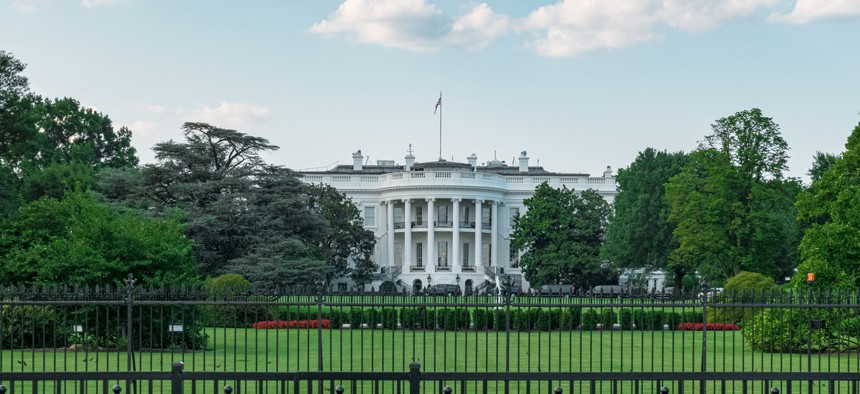Nascent Science and Technology Committee Broadens Call For Input On Efforts

anupap pokapanich/Shutterstock
The council—and call for input—are focused on four specific areas, though officials are also very interested in how relevant issues intersect.
A recently-launched National Science and Technology Council joint committee tasked with advancing the integrity and viability of America’s research landscape wants the public to weigh in on how it can do exactly that.
According to a request for information set to be published Tuesday in the Federal Register, NSTC’s Joint Committee on Research Environments, or JCORE, is looking to gain insight on how public, private and academic entities can work together to “maximize the quality and effectiveness of the American research environment” across four crucial fields for action.
“JCORE is working to address key areas that impact the U.S. research enterprise, enabling a culture supportive of the values and ethical norms critical to world-leading science and technology,” officials wrote in the document. “This includes the need to improve safety and inclusivity, integrity, and security of research settings while balancing accountability and productivity.”
Established in May to resolve some of the most daunting challenges across the nation’s science and technology research community, the committee went on to hold a White House summit in early November that brought together more than 150 representatives from industry, academia and senior officials from the State, Defense, Energy and Agriculture departments, National Security Agency, National Science Foundation, National Institute of Standards and Technology, and other agencies to inform its work.
Not every research stakeholder could attend the summit, so the JCORE team put forward the RFI questions “very purposefully” to engage all domestic and relevant international communities on the topic, an official close to the committee told Nextgov Monday. The ultimate hope is to ensure that all interested parties have the opportunity to inform future policy guidance, best practices and several related initiatives that are already underway.
JCORE is made up of four distinct subcommittees: the Subcommittee on Safe and Inclusive Research Environments, the Subcommittee on Rigor and Integrity in Research, the Subcommittee on Research Security and the Subcommittee on Reducing Administrative Burdens. The questions addressed in the RFI are categorized to specifically target the efforts and objectives of each of the four focus areas.
Research Rigor and Integrity
JCORE’s Subcommittee on Rigor and Integrity in Research is explicitly working to boost the “integrity, rigor, reproducibility and replicability” of American research and discoveries.
In this capacity, officials want the public to provide feedback on how the government can help ensure that appropriate practices and the scientific method are employed so that results and analyses are discovered and reported using unbiased and well-controlled means. This includes guaranteeing that researchers across the nation foster rigorous research and fully grasp the ethical principles of integrity.
The document calls for insight on this and on how to enhance multi-stakeholder collaboration on the topic. It also seeks to gain new details on the incentives and impediments federal agencies face as they work to facilitate and reproduce quality research.
Coordinating Administrative Requirements for Research
The Subcommittee on Reducing Administrative Burdens aims to help alleviate some of the arduous administrative work imposed on federally-funded researchers. The RFI asks the public to weigh in on a variety of measures that can be taken into consideration to help diminish the time and workloads both research institutions and agencies face in their efforts to access and administer federal grants and awards, while also balancing the necessity of appropriately reporting and meeting necessary administrative requirements.
Research Security
JCORE notes that while open collaboration underpins American and international innovation, “Over the past several years, some nations have exhibited increasingly sophisticated efforts to exploit [and] influence our research activities and environments.” In that light, the Subcommittee on Research Security seeks to safeguard the nation’s researchers from unreasonable influence, without compromising American values.
The public is also asked to offer insight on how to mitigate threats of inadvertently misappropriating research funds through “unethical behaviors.” The request also wants people to weigh in on disclosure requirements and policies. Officials also question how the government can better partner with entities across the American enterprise to significantly improve research security.
Safe and Inclusive Research Environments
Through the Subcommittee on Safe and Inclusive Research Environments, JCORE is also working to ensure that America’s research environments are inclusive, tolerant and free from any forms of harassment. Commenters are asked to share insight on the barriers to recruiting and retaining a diverse workforce and the best policies and practices to put in place that could potentially foster more safe and inclusive research environments.
Though the efforts are streamlined into four specific workstreams, the official also emphasized that the committee is deliberately taking a unique “integrative approach” because the problems—and solutions—of each frequently overlap. For example, JCORE is exploring—and notes in the RFI—how persistent digital identifiers can be used not only to reduce administrative work, but also boost the integrity and security of American research, which touches three of the four.
The committee plans to use the input received to inform policy initiatives, best practices and other deliverables that JCORE anticipates to release in the coming year. Interested individuals are invited to submit comments online by Dec. 23.






